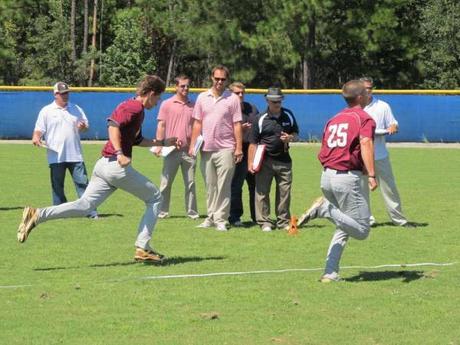The 60 yard dash has been a pretty standard event at virtually every showcase and tryout for many years now. How fast a player can run for that distance is not a bad indicator of overall athleticism but

Mix in a few 20 yarders!
in my opinion it has some functional problems. A player can go his entire career and not once have to run 60 yards in a straight line during a game. Long runs usually have at least one left turn in it after 90 feet.
That’s why if I ran the game, I would require players to do several types of 20 yard dashes along with the 60 yarder. 20 yard sprints are more the norm in baseball and give you a chance to see the explosiveness of a player right from the start. In my mind, how a player runs the first 60 feet (20 yards) will determine whether he gets to that ball hit to the gap. How a player runs the first 60 feet out of the box will also determine safe or out when going for a double or triple. In short, 20 yards is a player’s “usable speed.”
Here’s how I would run the times:
1st dash: Measure out 40 yards and put two cones, one at each end, on the ground. Have the player stand in the middle of the line so there are 20 yards on either side of him. Two timers are on each end. The player (wearing a glove) gets set. A coach standing in front of the runner lifts either his left or right arm. If the right arm is lifted, the runner sprints the 20 yards to that side. If the left goes up, he sprints and is timed on the other side. This would give a good indication of first step quickness as well as range for infielders and outfielders in a more game like situation.
2nd dash: Instead of having the two cones to either side of the runner, the runner turns so one cone is 20 yards in front of him and one is 20 yards behind him. The coach holds his hand up and points to the runner. When the runner is set, the coach either points to the ground or up to the air. If it’s down, the runner sprints forward 20 yards. If he points upward, the runner turns and runs back 20 yards. This dash indicates first step quickness and range on balls in front and over their head.
We’ve all seen players who are very fast but never seem to get a good jump on the bases or out on the field. I think the 20 yard dashes would help expose these types of players more often and give coaches and scouts a better idea of how a player’s speed and quickness translate to baseball.
Next post: Recognize abnormal

